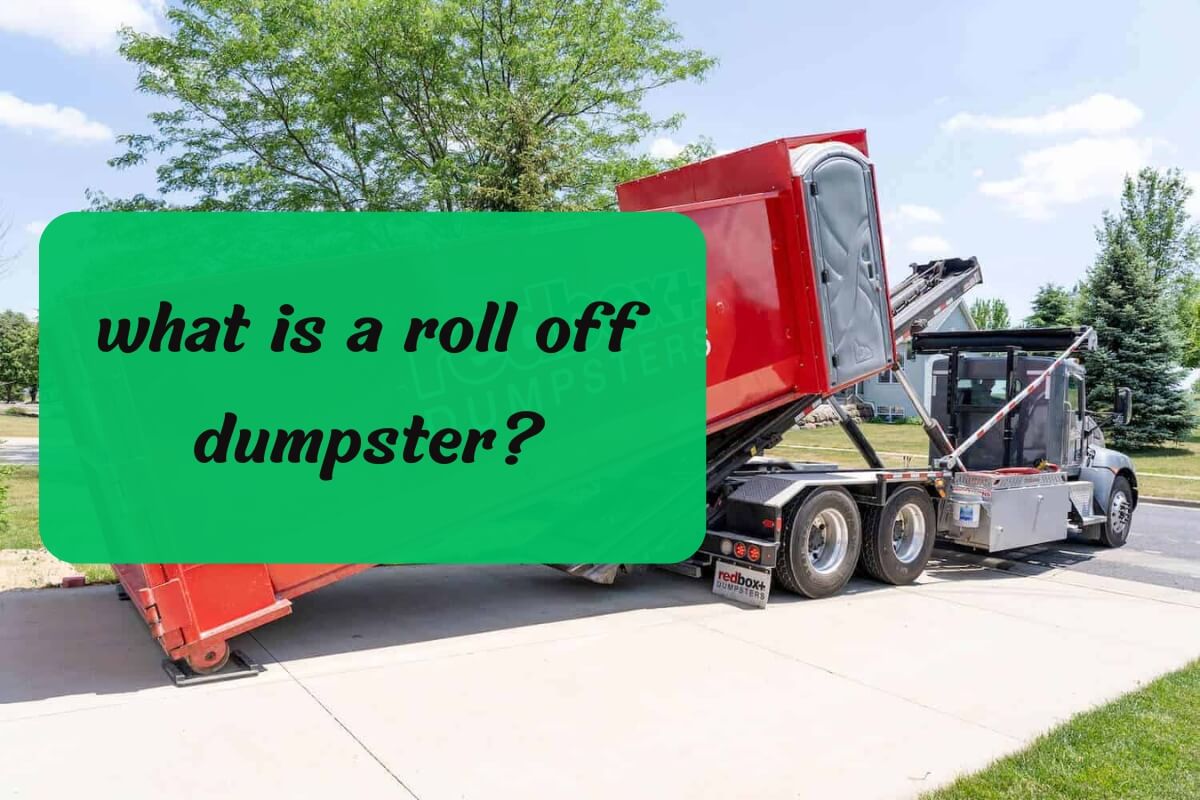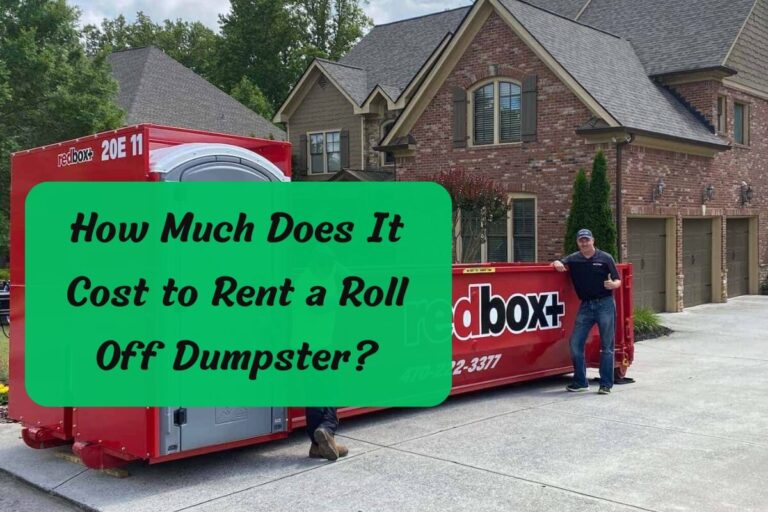
Getting rid of debris and waste from a major home renovation, construction project, or clean-out job can be a daunting task. A roll off dumpster is a large, open-top container designed for easily loading and hauling away heavy, bulky materials like construction and demolition debris. This in-depth guide covers everything you need to know about roll off dumpsters – what they are, common sizes, allowed materials, when to use them, costs, tips, and more.
Roll Off Dumpster Basics
Roll off dumpsters, also called construction dumpsters, trace their origins back to the 1930s when the Dempster brothers invented the first portable waste containers. However, the familiar rectangular, open-top design didn’t emerge until later.
The key difference between a roll off dumpster and a traditional dumpster is the open, rectangular shape along with mobility via wheels. This open-top design allows for easily walking in heavy or bulky items from above or through a swinging door on one end.
Roll off dumpsters have no compacting mechanism. Their mobility comes from being “rolled off” a special trailer truck when delivered to a home or worksite. Hydraulic cylinders on the truck gently lower the container into place.
Common Sizes of Roll Off Dumpsters
Roll off dumpster sizes are categorized by their cubic yard capacity – the amount of material they can hold. Common sizes include:
- 10 cubic yards (about 3-5 pickup truck loads)
- 15 cubic yards
- 20 cubic yards (most popular size, holds about 7 pickup loads)
- 30 cubic yards
- 40 cubic yards (largest standard size, around 5–6 tons of waste)
For example, a typical 20 yard roll off is 22 feet long, 7.5 feet wide, and 4.5 feet high. Dumpster dimensions can vary slightly by manufacturer.
All roll off dumpsters have maximum weight limits, usually between 3-6 tons depending on size. Going over risks damage and incurs overage charges from the rental company.
What Can You Put in a Roll Off Dumpster?
Roll off dumpsters are intended for construction, demolition, and renovation waste such as:
- Concrete, bricks, asphalt, dirt
- Roofing shingles and materials
- Drywall, wood, cardboard boxes
- Carpeting, flooring materials
- Fencing, decking materials
- Furniture, mattresses
- Yard waste like branches, brush, logs
- General house/garage cleanout junk
However, there are also many prohibited materials that rental companies do not allow, including:
- Hazardous materials like asbestos, lead paint chips
- Chemicals, pesticides, oil/gas
- Batteries, tires, rubber
- Large, bulky vehicles or vehicles
- Refrigerant appliances
- Human/medical waste
- Wet waste like food
Always check your dumpster rental company’s specific restricted item list. Violating these can result in fines or having the dumpster refused for pickup.
When to Use a Roll Off Dumpster
A roll off dumpster rental is ideal for any home renovation, construction, demolition, or cleanout project generating large amounts of solid waste. Some common scenarios include:
- Building a new home or addition
- Major kitchen or bathroom remodel
- Replacing siding, windows, or roofing
- Demolishing a shed, deck, or interior walls
- Excavating/grading a basement or yard
- Cleanout of home, garage, or storage units
For smaller-scale debris and junk removal needs, using a junk hauling service is often cheaper and more convenient than renting a full dumpster.
How Roll Off Dumpster Rentals Work
Renting a roll off dumpster is a straightforward process:
- Determine the proper dumpster size needed for your project’s waste
- Choose a dumpster rental company and schedule delivery
- Make sure you have a viable placement spot for the dumpster
- Load it up with your debris and materials
- Schedule a pickup when the dumpster is full
Many companies offer flat daily, weekly, or monthly roll off dumpster rental rates. You typically have a set timeframe like 7-14 days to fill the dumpster before incurring additional charges.
Some roll offs also have specialized “walking floor” hydraulics that allow you to unload easily from the dumpster’s open end versus throwing items up and over the sides.
Costs of Renting a Roll Off Dumpster
Roll off dumpster rental costs vary based on several factors:
- Dumpster size (larger = more expensive)
- Location and delivery costs
- Rental period (day, week, month pricing)
- Disposal/landfill fees in your area
- Taxes and potential permitting fees
In general, expect to pay anywhere from $300 to $600+ for a standard 20-30 yard dumpster rental with delivery, pickup, and disposal fees included.
To get the most accurate pricing, it’s best to get quotes from 2-3 local roll off rental companies and compare options. Be sure to also ask about any other potential charges like permit fees, overweight fees, late charges, and taxes.
Tips for Using a Roll Off Dumpster
Using a roll off dumpster safely and efficiently is important. Follow these tips:
- Have a designated open area for dumpster placement like a driveway or street
- Protect surfaces under the roll off with plywood if needed
- Allow ample clearance for the delivery truck to access the spot
- Load heavier debris towards the back of the dumpster
- Break down/flatten large, bulky items to maximize space
- Do not overload the dumpster past its weight limit
- Never put anything hazardous or prohibited into the dumpster
- Schedule your dumpster pickup promptly when full
Always practice proper safety like wearing work gloves, safety glasses, steel-toed boots when loading large, heavy items.
Frequently Asked Questions
Can I put concrete in a roll off dumpster?
Yes, roll off dumpsters are ideal for loading and disposing of heavy debris like broken concrete, bricks, blocks, asphalt, and dirt from demolition or excavation projects.
How long can I keep a rented dumpster?
Most companies offer set 7-day or 14-day periods included in the base cost. You can often extend the rental period for a fee if needed.
Do I need a permit for a dumpster?
Requirements vary by city/municipality, but generally no permit is needed if the roll off will stay on your private property. Public street/sidewalk placement may require a permit.
How much does a 20 yard dumpster weigh when empty?
An empty 20 yard metal roll off container typically weighs between 4,000–6,000 pounds depending on the specific size dimensions and construction.
Conclusion
A roll off dumpster is an efficient, versatile solution for managing large amounts of solid waste from construction, renovation, demolition, and home cleanout projects. With a variety of dumpster sizes available, you can easily load heavy debris and materials into the open-top rectangular container.
Taking the time to understand roll off basics like sizes, allowed materials, rental process, costs, and safety ensures your dumpster experience goes smoothly from delivery to pickup. Don’t underestimate how much debris your project may generate – overloading is risky and could lead to injury or fines.
When it’s time to take on that big home project, keep roll off dumpster rental in mind as the best way to responsibly dispose of the waste. Shop around with a few local rental providers, know what you’re allowed to toss, budget accordingly, and get ready to create quite a bit of open space at your property!


